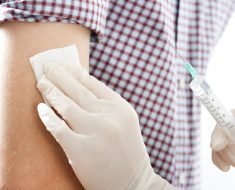 About 15-30% of people have daytime bad breath or halitosis. The good news is that if you have bad breath, there are things you can do to make it better. There are also things you can do to prevent it. Read on to learn more.
About 15-30% of people have daytime bad breath or halitosis. The good news is that if you have bad breath, there are things you can do to make it better. There are also things you can do to prevent it. Read on to learn more.
What is bad breath?
Bad breath, or halitosis (the medical name) pronounced, hal-e-toe-sis, is a “a noticeable and unpleasant odor in the breath. It can be embarrassing, and often hard to recognize because it’s very hard to smell your own breath.
What causes halitosis?
Most of the time bad breath is caused when food collects and then gets trapped between the teeth and the tongue. The food that’s stuck breaks down and releases bacteria. The bacteria then release a sulfur gas, which smells bad. Bad breath can also be caused by bacteria trapped in the sinus passages of the nose when a person has a sinus infection.
Other causes of bad breath may include:
- Smoking
- Eating certain foods such as garlic
- Dry mouth (when the saliva flow decreases) which can be caused by certain medicines or breathing with your mouth open
- Nasal (nose) infections or problems affecting nasal airflow or mucus production
- “Tonsoliths” – small stones attached to the tongue and made by the tonsils can cause a bad smell when a person with them coughs
- Tooth decay and gum disease (sometimes called gingivitis)
- Problems with your digestive system
- Other health problems (rarely)
When do most people have bad breath?
It’s normal to have bad breath after you wake up. This is because there’s very little saliva (or spit) flowing through your mouth while you’re sleeping, which is when bacteria are most active. Your breath should improve after you brush your teeth and tongue and floss your teeth.
How can I tell if I have bad breath?
It’s hard to check your own breath. Even breathing into your hand and trying to smell your breath doesn’t work. Your best bet is to ask someone you’re close to. Ask them if they’ve noticed that you have bad breath. If they say yes, ask them if it’s when you eat certain foods or whether it’s all the time. Then try the tips below and check back with the person to see if it’s made a difference.
Ways to help prevent and/or treat bad breath:
- Brush your teeth for at least 2 minutes twice a day with toothpaste that contains “flouride”; brush after breakfast and before bed (or after every meal if you can).
- Floss every day. Flossing gets food particles and bacteria that your toothbrush cannot reach. If you don’t know how to floss, ask your dentist to show you.
- Brush your tongue (with a plastic tongue cleaner), especially the back of your tongue – where the bacteria that cause bad breath live.
- Gargle with mouthwash at bedtime. Althought mouthwash is a temporary solution, it can be helpful. Aks your dentist or look for a mouthwash that has a seal from the American Dental Association.
- Don’t smoke or chew tobacco. Smoking causes bad breath and may lead to gum disease. Smoking and chewing tobacco also puts you at risk for getting oral cancer.
- Chew sugarless gum (for about 5 minutes or less) if you can’t brush right after a meal. This can help to clear away food particles left behind after eating.
- Drink less coffee.
- Eat foods high in fiber such as whole grains, raw fruit, and veggies.
These tips are your first step towards fresh breath and great dental hygiene. Eating a healthy diet and staying hydrated will help too. Avoiding food with garlic or onions and staying away from drinks such as coffee will also help.
Who do I make an appointment with if I have bad breath that isn’t going away?
If you’ve tried many different ways to manage your bad breath without good results, it’s a good idea to make an appointment with your primary care provider or dentist.
Source: Read Full Article





